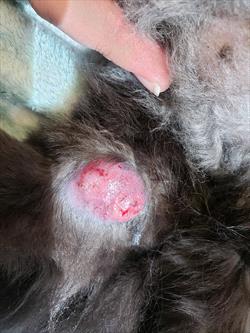
Van Nimwegen F et al. If your cat has high-grade or large-cell lymphoma the prognosis for untreated cats is guarded with an average survival time of approximately two months or less.

If you do nothing or if the treatments no longer work in end-stage lymphoma the average life expectancy is about six weeks.
How long do cats live after being diagnosed with lymphoma. In the best case scenario the lymphoma can be surgically removed and will never grow back so the cat can live a normal life. However surgery is only possible in very few cases and the tumor can grow back. If the lymphoma is not operable a cat can live up to 2 or even years.
How Long Can cats live with lymphoma. Cats with lymphoma who are not treated with chemotherapy have an average survival time of 4 weeks once the diagnosis has been made. Cats with intestinal lymphoma who are treated with prednisone alone have a life expectancy of 60-90 days.
Average survival with this type of lymphoma is only 3-6 months though there are isolated reports of cats surviving far longer. Renal lymphoma has a tendency to spread to the brain and central nervous system. This occurs in approximately 40 of renal lymphoma cases and worsens the prognosis for this disease.
How long do cats live after being diagnosed with lymphoma. There are a lot of variables so it depends. If youre able to treat the lymphoma and your cat responds well your cat could live anywhere from seven months to three years.
Cats who are treated for lymphoma can get almost two years of life much of it with little or no pain. If you do nothing or if the treatments no longer work in end-stage lymphoma the average life expectancy is about six weeks. Even then cancer is relatively unpredictable – it can start to slow down or speed up as it spreads prolonging or shortening her life expectancy.
The amount of time she went before being diagnosed can make a difference too. If your vet catches the cancer early and before it spreads the odds of treating it successfully are generally improved. If your cat has high-grade or large-cell lymphoma the prognosis for untreated cats is guarded with an average survival time of approximately two months or less.
Combination chemotherapy with a three to five drug combination alongside with prednisolone is the standard of care treatment modality. The statistics and data I memorized in order to become a board certified medical oncologist tells me that without treatment dogs diagnosed with lymphoma live an average of one month. With treatment survival time is about 12 months.
This information was relayed to both owners including expected quality of life both with and without treatment. I did have a Black Lab that succumbed to lymphoma after being in remission for 6 months. She was treated at the University Animal Hospital with chemo and oral meds.
I did a forum search on Cats on lymphoma and only found two threads about a C-D members wonderful 19 yr old cat who succumbed to lymphoma after a couple of months. I wanted to start a thread cats being diagnosed and treated for lymphoma so we can share experiences and learn from each other. Fletcher is almost 10 years old.
If the cat has high grade lymphoma they may experience short term relief with treatment but will often become ill again between 2-8 months. High grade lymphoma is of course more fatal. Because of the kidneys involvement in this form of the disease cats have a.
I recently lost a cat to large cell Lymphoma which was originally in his spleen. I know that cats with small lymphoma can live much longer. The very best case scenario for my guy was that he would live about 2 more years from his diagnosis and enjoy a very good quality of life.
I would do it all over again if faced with the same situation. Van Nimwegen F et al. Cardiovascular Disease After Hodgkin Lymphoma Treatment 40-Year Disease Risk.
Small cell lymphoma low grade is associated with an excellent prognosis with most cats living two or more years on oral chemotherapy at home. However high grade lymphoma large cell is associated with a poorer prognosis with the majority of cats succumbing to the illness within the first year after. The primary function of lymphocytes is to protect the cat from foreign bodies or substances that may cause harm.
The cancer is most commonly found within the gastrointestinal tract though it may affect any and all parts of the lymphatic system. Its famously difficult to predict how long they have left for anyone and with cats and their private sometimes unpredictable natures its even harder. Cancer doesnt always follow the text book and your cat may not either.
We all want to do what we can to make sure our pets are not in pain and feel well enough to enjoy life. Cats diagnosed with lymphoma tend to be middle-aged or older although cats can develop lymphoma at any age. While there are no breed dispositions for lymphoma cats who have had either leukemia or immunodeficiency virus have a higher risk of developing lymphoma.
Sadly as cats live longer thanks to improvements in quality of care better nutrition and preventative care they often succumb to cancer as they age. There are several types of cancer in cats and one that I see the most is lymphoma in cats. How long will my cat live.
The life expectancy of cats with lymphoma varies immensely depending the age of your cat where the disease is situated and how far advanced it was when first diagnosed. Generally surgery is not usually enough on its own to halt the spread of lymphoma in cats and without other treatment like chemotherapy survival time is again only about two months.